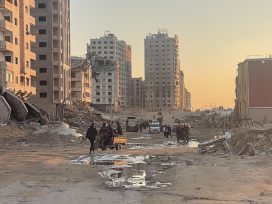
Israel has authorized a full military takeover of Gaza exactly twenty years after declaring it had ‘left’ the Strip. Disengagement failed because it was never designed to succeed – least of all on Palestinian terms.
Hamas’s act of terror a year ago and Israel’s devastating military response have triggered a series of epochal shifts. Globally, the West is losing support; while socially, the escalation in the Middle East is causing an ever-sharper polarization.
The mass murder committed by Hamas against Israeli civilians one year ago – in which over 1200 people were killed and over 250 people taken hostage, more than half of whom have since been killed or remain unaccounted for – has traumatized Israeli society. Not since the Holocaust have such heinous crimes been committed against Jewish people. The victims of Hamas’s act of mass terror were civilians. Its perpetrators have shaken the belief in the state of Israel as a guarantor of security and protection for Jews.
But the devastating Israeli military retaliation – which has killed more than 40 thousand people in Gaza, most of them women and children, with a further ten thousand thought to be buried under the rubble – has caused the longstanding conflict to take on an unprecedented intensity. The horrifying escalation of violence in Israel–Palestine has polarized public opinion worldwide.
One year on, the outcome of the ongoing conflict remains utterly unpredictable. What is clear is that the main preconditions for escalation – a regional or even global conflagration, one pitting Iran, Hezbollah and Hamas against Israel and the United States – are now all in place.

Cartridge at a site of the Hamas attacks on 7 October 2023. Image: Spokesperson unit of ZAKA photographer / Source: Wikimedia Commons
The Israeli’s government’s war of retaliation against Hamas has as its objective the elimination of this complex, socially embedded organization. In A. Dirk Moses’s phrase, Israel is pursuing the ‘sinister ambition of permanent security’: under the guise of the ill-defined – and indefinable – objective of eliminating Hamas, the Israelis have been persecuting the two million inhabitants of the Gaza Strip.
Israel’s rightwing political elite – either in a state of shock or to conceal its own failure to prevent the attack – has carelessly walked into the trap set by Hamas. But its lethal counterattack has had the effect of bringing attention to the Palestinian national cause in an unprecedented way. At the same time, Israel’s global standing has plummeted to unseen lows. Particularly among members of younger generations, the online dissemination of images of the destruction in Gaza has deeply tarnished Israel’s reputation.
Much more importantly, it is also clear that the civilian population of Gaza has paid the ultimate price for Hamas’s trap. But while such a calculus highlights the utter immorality of the radical Islamists, if anyone still doubted it, the vast human suffering inflicted upon Gaza remains the sole responsibility of the State of Israel.
Almost all the parties are unanimous that the violent conflict, ongoing for generations, was initiated by the other side. Such claims reveal a symmetrical refusal to compromise.
The starting point of the current crisis is 1967, when the Israeli army won a crushing victory over its Arab neighbours and occupied all the territory between the Mediterranean Sea and the Jordan River. The Israeli government then placed the parts destined for a Palestinian state under military occupation. Soon afterward, it also began to support Jewish settlers, many of them religious fanatics, who wished to move into the Occupied Palestinian Territories.
As a result, for more than half a century now, the state of Israel has been operating as an ethnic democracy that tries to guarantee equality for its Jewish citizens while – like previous colonial powers – systematically excluding the Arab-Palestinian inhabitants of the territories it occupies.
At more optimistic moments in the 1990s, Israel’s leadership nominally accepted the two-state solution, i.e. the future creation of a Palestinian state, which it had previously boycotted. However, citing existential security concerns, Israel’s actions have since made the prospect of Palestinian sovereignty virtually impossible. The Israeli army did withdraw from Gaza in 2005, dismantling local Jewish settlements. But after the Islamist radicals of Hamas gained power in Gaza in 2007, Israel proceeded to build a security wall around the enclave and impose an economic blockade.
Meanwhile, in the West Bank, Israel has continued to support the settler movement and growing discrimination against local Palestinians. Unless Israel is prepared to withdraw from the Occupied Palestinian Territories, in accordance with international law, and even use force to dismantle its own fundamentalist movement there, its leadership will continue to undermine the very possibility of a two-state solution.
However, by torpedoing the two-state solution, Israel has not alleviated its fundamental dilemma – its catch-67, in Micah Goodman’s merry phrase. Quite the contrary.
If Israel, which possesses dominant, not to say overwhelming power in the region, does not accept the creation of an independent Palestinian state, it should grant citizenship to the Palestinian population living under its rule. However, by doing so, it would risk its very raison d’être, that of being a state with a Jewish majority. If, on the other hand, Israel continues to deny equality to those under its authority and to run a grossly discriminatory regime, it will be exposed to the charge of apartheid.
There is no doubt that Israelis have preferred a Jewish and exclusionary state in recent years. Nor is there any doubt that their preference has been reinforced in the wake of October 7.
It was predictable that the political culture of a country that has operated such a discriminatory dual regime in the Occupied Palestinian Territories would shift to the far right. So much so that conservative populist prime minister Benjamin Netanyahu, who has dominated Israeli politics for the past three decades, returned to power in 2022 in a coalition with rightwing extremists. In 2023, Netanyahu and his partners were preparing ‘reforms’ which, if implemented, would have amounted to a judicial coup. This provoked a series of mass demonstrations, triggering perhaps the worst internal crisis in Israel’s history.
Despite the cyclical upsurge of violence – Israeli acts of oppression followed by Palestinian attacks, followed in turn by significantly more destructive Israeli counter-attacks – and a marked decline in sympathy for Israel in western circles, the Palestinian question has remained more or less marginalized in Israeli political life. So much so that not even the Israeli mass demonstrations of 2023 addressed the oppression of the Palestinians in any meaningful way – despite the obvious link to the far-right turn of the Jewish state.
Like it or not, Hamas’s act of terror a year ago has had a transformative impact in this respect. It has not only plunged Israel into the gravest crisis in its history, both internally and externally; equally importantly, Israel’s overwhelming and devastating military response has catapulted the Palestinian cause into the very centre of public attention across the globe.
We are living through a geopolitical turn and the formation of new blocs. The West, which prefers to present itself as the democratic world, is currently in fierce competition with what is sometimes called the ‘global East’. The latter powers, primarily China and Russia, combine illiberalism and declarations in favour of multipolarity with their own imperialism, as well as support for decolonial activism when it suits them. There are no lines left, only wires, as Giuliano da Empoli notes in his novel The Wizard of the Kremlin.
The western alliance has gained new resolve with its effective, if precarious, opposition to Russia’s full-scale invasion of Ukraine. This is one of the reasons why Israel’s protracted war against Gaza is posing such a serious challenge to the collective West’s self-representation and preferred interpretations of global politics.
For if the West strongly condemns Russia for its belligerent disregard for Ukrainian sovereignty – which it rightly does – then it cannot, without contradicting itself, ignore the Palestinians’ own yearning for self-determination. To say nothing of the conundrum of how, if the West wishes to portray warfare involving mass violence against civilians as characteristic of autocracies, it can continue to treat Israel as an integral part of the democratic world.
Yet the United States has remained steadfast in its political and military support for Israel, despite domestic critics of its foreign policy intransigence, which include American Jews. Geopolitical factors have been decisive here, since Israel’s main enemies – Iran and its Islamist proxies, Russia, and to an extent China – are also its own main rivals.
It is striking that, despite the successful insistence on western unity, it has not been possible to form a global grand coalition to condemn Russia’s blatant aggression. Currently, the US has a much harder time finding partners for its support of Israel. All the larger states that continue to be staunchly committed to Israel are central and eastern European, such as Germany, the Czech Republic and Hungary. The latter, with its uncritical stance toward both Russia and Israel, offers a model of the rightist-illiberal formula. Among those states that respect the fundamentals of international law and human rights, we see the exact opposite. For them, the urgent protection of the peoples of both Ukraine and Palestine has become a crucially important cause.
These positionings also suggest that we might be dealing with an epochal realignment in western political culture.
Western far-right forces, including many post-fascist formations, have transformed their fierce antisemitism into hatred towards Muslims. They now also often declare themselves to be supporters of the State of Israel. On the liberal left side, which has long been committed to self-critical forms of Holocaust remembrance and has supported Israel on grounds of historical responsibility, there are growing signs of doubt and reassessment.
This turn of events is not as peculiar as it may seem, given that Israel – which was established three-quarters of a century ago as a socialist ethnic democracy and refuge for Jews who had been persecuted in Europe – has now become a global symbol of militant ethnic politics. As the Bulgarian political scientist Ivan Krastev has argued: Israel has virtually everything that rightwing nationalists can typically only dream of.
Illiberals now attack progressive activists and critical intellectuals under the guise of fighting antisemitism. We have seen numerous blatant cases of this in the United States, where rightwing politicians have targeted leading universities, with varying degrees of success. To emphasize this is, of course, not to deny that there has been a notable increase in antisemitic incidents on many American campuses over the last twelve months. We have also seen that institutions in Europe, particularly in Germany, which proclaim a policy of zero tolerance toward antisemitism, have repeatedly sanctioned academics and thinkers – who may be, and often are, Jewish – for their ‘overly critical’ stance on Israel. Plus ça change…
All of this is an intensification of a political manoeuvre that started years ago, aimed at defining antisemitism not as the demonstrable expression of anti-Jewish prejudice, but as any and all criticism of the State of Israel. This recoding amounts to the defence of the policies and actions of a state, regardless of their actual content.
There are certainly many who hold Israel’s policies to a higher standard and criticize them more harshly than those of other states. Double standards, however, are found on the other side too: many people tend to condone or at least remain silent about violations by Israel that they would in other cases condemn. It is easy to see that the latter is the greater problem – the human cost of applying ‘unrealistically high standards’ is much lower than accepting violations, and may even bring benefits.
The other side of the story has been no less remarkable.
The war crimes committed by the Israeli state, which its critics say amount to genocide, mean that the Palestine cause is now able to mobilize mass support in the West as well. But while critics of Israel are right on many points – the colonial ambitions of the settlers, the apartheid-like regime, and the ongoing mass violence against civilians in Gaza, have all been documented convincingly and in detail – the question remains to what extent pro-Palestinian mobilization reproduces quasi-moral critiques of Judaism with antisemitic motives.
It is well known that radical antisemites portray Jews as quintessentially evil. Typically, they believe in a Jewish conspiracy to dominate, against which almost any ‘act of resistance’ then seems justifiable. Several contemporary critics of Israel on the radical left – consciously or unwittingly, but in any case demonstrably – draw on this powerful, abhorrent tradition.
It should be stressed that even vehement verbal attacks on the State of Israel are often fuelled by a strong desire for justice. As the Jerusalem Declaration on Antisemitism rightly emphasizes, ‘the line between antisemitic and non-antisemitic speech is different from the line between unreasonable and reasonable speech’.
Nevertheless, in a strange mirror image of the far right, we also see cases of unprincipled pro-Palestinianism among those on the radical left. The latter often projects progressive aspirations onto the Palestinian people, oppressed by both Israel and the Islamists, while preferring to ignore the darker aspects of Palestinian political culture and struggle. While the main motivation of such leftwing radicals is typically not antisemitic, recent months have starkly highlighted the lack of even the most basic empathy for Israeli citizens among some of them.
As Adam Kirsch recently put it, for leftists who propound the theory of settler colonialism, Israel/Palestine offers a dangerous hope: it appears to be that rare case where they might achieve their goal of decolonization. Notwithstanding all their factual and entirely legitimate criticisms of current Israeli crimes, when cherishing such fierce and unreflective desires, they themselves contribute to the spiral of radicalization.
These powerful new trends in western political culture are, frankly, quite frightening.
Instead of those who articulate a realistic project of progress toward equality of rights, and firmly reject the use of violence against civilians, it is the most pernicious forms of polarization in the Middle East that have become more prominent in many western discussions, at a time when there is an urgent need for bipartisan de-escalation.
A longer English-language version of this article is available at the Review of Democracy. The original, Hungarian-language version of this article appears in Transtelex.
Published 7 October 2024
Original in English
First published by Review of Democracy / Eurozine
Contributed by Review of Democracy © Ferenc Laczó / Review of Democracy / Eurozine
PDF/PRINTSubscribe to know what’s worth thinking about.

Israel has authorized a full military takeover of Gaza exactly twenty years after declaring it had ‘left’ the Strip. Disengagement failed because it was never designed to succeed – least of all on Palestinian terms.

Gaza and the age of impunity; Islamism and leftwing anti-Zionism; dead-ends of Staatsräson; illiberal rap.